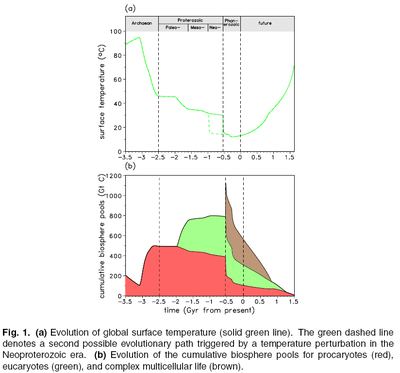May 23, 2009
Is the biosphere unsustainable?
 Peter Ward's The Medea Hypotehsis is interesting, disturbing and a bit annoying. Most of all, it is an antidote to naive Gaianism. Ward argues that the Earth's biosphere is not a self-regulating, self-improving or self-preserving Gaia but something more sinister: a system prone to crashes, declines and a lifespan shortened by its own activity.
Peter Ward's The Medea Hypotehsis is interesting, disturbing and a bit annoying. Most of all, it is an antidote to naive Gaianism. Ward argues that the Earth's biosphere is not a self-regulating, self-improving or self-preserving Gaia but something more sinister: a system prone to crashes, declines and a lifespan shortened by its own activity.
The core idea is to check whether the claims of the various Gaia hypotheses hold up. He points out that many mass-extinctions appear to be biogenic: they are the fault of biological processes rather than meteors. He finds that there is no evidence for increasing diversity over time; recent data suggests it has been constant for a long time, and may have been higher in the pre-animal era. The total biomass of Earth may have peaked between a billion and 300 million years ago and have been declining ever since. Carbon dioxide levels have been declining due to increased weathering due to vascular plants, and will in the long run become so low that there is good reasons to think plants will go extinct, in turn leading to the loss of an oxygen atmosphere, oceans and life (long before the end of continental drift or increasing solar luminosity becomes a problem). The biosphere is unsustainable.
His conclusion is that we humans have a responsibility to set things right. The green thing to do is not to turn back to a preindustrial state and let nature take its course. First, it is unlikely to work, second, drastic means may be necessary to even limit the current greenhouse damage, and third, we are so far the only species able to prevent the long-term disasters the biosphere may be blundering into. If we have to use nuclear power, geoengineering, dam up the Greenland inland seas or whatever, so be it. If we really want to ensure that the biosphere thrives we will have to intervene on an enormous scale over long, perhaps indefinite, timescales.
Ward's case against Gaia appears relatively convincing. There doesn't seem to be any selection mechanism for negative feedbacks on the biosphere level. We know that species often evolve down cul-de-sacs (e.g. predators overspecializing and then getting wiped out by fluctuations), so it would be strange that the next level would be immune to it. As Ward points out, evolution favors species that set up positive feedback loops in their favor, no matter what the eventual outcome is, so evolution would tend to wreck Gaia. The individual examples of non-Gaia events or trends may be more problematic: much is based on new data, theories and models and hence likely to be changed. But he probably has enough examples to reliably refute most Gaia hypotheses - it is somewhat mysterious to me why people are so eager to believe suspiciously strong Gaia models (even leaving aside any New Age connotations).
The book could have done with better editing; it often repeats itself. In many ways it could have been shorter, except that the publishers no doubt wanted a "real" book.
It is a good introduction to the big geodynamic feedbacks regulating the planet, and it might make great reading for someone wanting to invent their own world for roleplaying or fiction. The sinister Canfield oceans are simply too good to pass up. I found S. Franck's future biosphere models quite fascinating; this is how to make a realistic "Dying Earth".
This is a Big Picture book. To Ward a hundred million years is a short time, and we really should be concerned about the next eon. Yet his proposals for action betray a relatively limited thinking: he is assuming that the next millennium will be inhabited by recognizable humans having roughly comparable needs to us. For example, he argues against space colonization based on the problems of sending humans around great distances and timespans. While this works as a kind of minimal hypothesis, I think he underestimates just how quick and weird humans are. Just a *mild* form of posthumans, say brain emulations, can change the ecological rules of mankind totally in what I estimate less than a century. While doing earth systems engineering might sound very radical today it is merely an extrapolation of our current (often inadvertent) activities. Doing a similar extrapolation of our other capabilities would suggest that within both geologically and climatologically short timescales we could both change ourselves and the rules of the biosphere radically. We still need to start now and we still need the change in perspective in ecological thinking Ward discusses. In a way he is suggesting trans-ecology (to ecology as transhumanism is to humanism), and I'm suggesting we might move into a post-ecology.
Posted by Anders3 at May 23, 2009 03:53 PM
